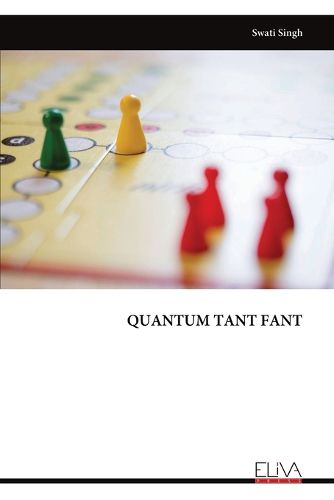Readings Newsletter
Become a Readings Member to make your shopping experience even easier.
Sign in or sign up for free!
You’re not far away from qualifying for FREE standard shipping within Australia
You’ve qualified for FREE standard shipping within Australia
The cart is loading…






This title is printed to order. This book may have been self-published. If so, we cannot guarantee the quality of the content. In the main most books will have gone through the editing process however some may not. We therefore suggest that you be aware of this before ordering this book. If in doubt check either the author or publisher’s details as we are unable to accept any returns unless they are faulty. Please contact us if you have any questions.
The Tant-Fant finds its origin in Bengal, India. The original game hereby referred to as the classical game has two players. To develop a basic understanding in the reader's mind, the paper describes the rules and strategies for playing Tant-Fant in detail. The classical game board can be drawn on paper, played on board, or a web reference available. In the classical version, players ought to have three pieces aligned in a row termed as a three-in-a-row either horizontally, vertically, or diagonally but not on the players' initial position also termed as the home row. Alternatively, the players can make specifically a diagonal three-piece alignment also termed a diagonal three-in-a-row. QTF uses the counter-intuitive principles of quantum superposition and collapse to design new moves. The players may choose from either of the two quantum moves, QM1 and QM2 which are equivalent to placing a superposition of pieces in different squares. The quantization of a given game use fewer steps in comparison to classical computation, bringing out previously non-existing strategies for game playing and for tackling more and more complexities in the game. Quantum computers are finding potential applications in almost every field of life. As the quantization of many classical games has already been achieved, the quantization of a lost traditional game would be an interesting feat to achieve.
$9.00 standard shipping within Australia
FREE standard shipping within Australia for orders over $100.00
Express & International shipping calculated at checkout
This title is printed to order. This book may have been self-published. If so, we cannot guarantee the quality of the content. In the main most books will have gone through the editing process however some may not. We therefore suggest that you be aware of this before ordering this book. If in doubt check either the author or publisher’s details as we are unable to accept any returns unless they are faulty. Please contact us if you have any questions.
The Tant-Fant finds its origin in Bengal, India. The original game hereby referred to as the classical game has two players. To develop a basic understanding in the reader's mind, the paper describes the rules and strategies for playing Tant-Fant in detail. The classical game board can be drawn on paper, played on board, or a web reference available. In the classical version, players ought to have three pieces aligned in a row termed as a three-in-a-row either horizontally, vertically, or diagonally but not on the players' initial position also termed as the home row. Alternatively, the players can make specifically a diagonal three-piece alignment also termed a diagonal three-in-a-row. QTF uses the counter-intuitive principles of quantum superposition and collapse to design new moves. The players may choose from either of the two quantum moves, QM1 and QM2 which are equivalent to placing a superposition of pieces in different squares. The quantization of a given game use fewer steps in comparison to classical computation, bringing out previously non-existing strategies for game playing and for tackling more and more complexities in the game. Quantum computers are finding potential applications in almost every field of life. As the quantization of many classical games has already been achieved, the quantization of a lost traditional game would be an interesting feat to achieve.